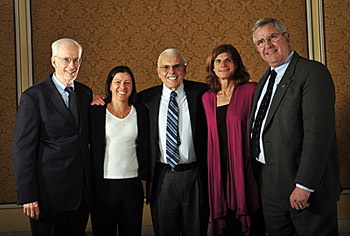A few thoughts from Karen Smyers, Hall of Famer
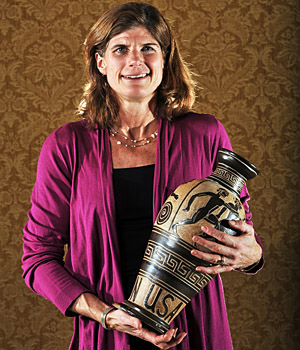
There was no one whose selection to the inaugural class of the USA Triathlon Hall of Fame January 17 at Colorado Springs was more deserving. Oddly enough, this was a first, as Smyers has not yer been chosen for the Ironman or Triathlete Halls of Fame. Searching for a reason, however flimsy, it might be thus: Baseball, football and basketball Halls of Fame hold off voting until their candidates have been retired for a decent number of years. And Smyers, with an unquenchable passion for her sport, is apparently nowhere near retirement. At age 47, she is about to enter her 26th year in the sport and thoughts of settling down and returning to age group competition are still off the table.
Competitively, her record belongs in any Hall of Fame serious about its mission. Smyers has won the ITU Olympic distance World Championship in 1990 and 1995, and completed an historic double by taking the Ironman World Championship in that same year of 1995. Smyers also won the 1996 ITU long course World Championship in Muncie, Indiana, took seven US elite titles, won Pan American gold in 1995 and 1999, and won the ITU Triathlon World Cup overall title in 1991. Lest anyone think she is somehow over the hill at six years past Dara Torres, she won the Timberman half Ironman in 2004, and in 2005 took 4th places at Ironman Lake Placid and at Eagleman, and a 9th place at Ironman Hawaii. But she topped that off with a second place finish in the highly competitive Ironman 70.3 Florida in 2007.
Smyers is equally well known for her survivor’s pluck. She came back from a sliced hamstring suffered while changing a storm window, rebounded back from a collapsed lung and multiple broken bones when hit by an 18-wheel truck on a training ride near her Lincoln, Massachusetts home, shook off a broken collarbone and multiple injuries in a 1999 race crash (which ended her 17-year streak of never dropping out of a race ), and survived a scary bout with thyroid cancer in 1999.
Now a mother of 10-year-old Jenna and 5-year-old Casey, wife of movie producer Michael King, Princeton grad Smyers retains her blue collar tastes — she is the triathlon star most age groupers would like to have beer with – a gracious humility and a sense of humor. She shared a few thoughts on a triathlon life in full at the USA Triathlon ceremony at the Broadmoor Hotel.
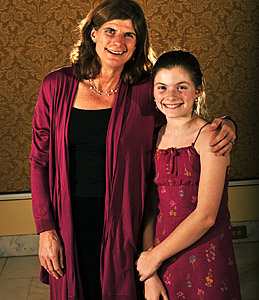
Slowtwitch: What’s it like to sit on the sidelines and watch your children compete?
Karen Smyers: I never thought I’d be able to experience: the thrill of competition without competing myself until I saw my daughter (Jenna ) doing her first triathlon. Or doing her first big soccer match and realize, ‘My God! My heart is now beating outside my body!’ I’m going to be a pretty poor soccer mom I am afraid.
ST: How does it feel to make it into the inaugural class of the USA Triathlon Hall of Fame?
KS: Knowing some of the people who obviously didn’t get in on the first class, it is kind of shocking more than anything. I am so glad that USA Triathlon is starting to honor the history of our sport in this way and people can look back on it, because as it is there are a new lot of people in the sport who ask ‘Karen Who?’ when my name comes up. So, now I am pleased that I can say I’m in the Hall of Fame.
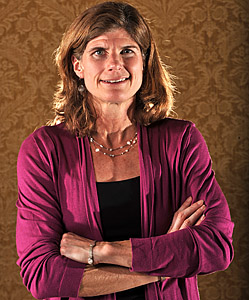
ST: What was it like to be present at the creation of professional triathlon, within a decade (from the first triathlon in 1975 to entering the sport in 1984, two years after the founding of the USTS series)?
KS: I’ve been thinking a little bit about the early days and it's come along way in terms of the politics and the federation itself. And the races. At first it was pretty disorganized. There were things happening.
ST: Was there a turning point in your mind?
KS: It was kind of fun because it was really the formation of the governing bodies and the ITU and I remember being in a room at the very first World Championship in 1989 at France and afterwards and sort of high fiving: Like wow! We were all in a room with all the people who were instrumental in getting it off the ground – Les McDonald, Mark Sisson.
ST: At that point, you may have thought triathlon was joining the big time of international sport with an ITU World Championship and a bureaucracy designed to fit into the International Olympic Movement. But would it retain its own unique identity?
KS: When we got there, as typical French people do, they decided that the men were going to get more prize money than the women. And the men just stood up and said We are not racing if you don’t make it equal with the women. That was a very cool thing. Mark Allen and Mike Pigg and all the rest of the athletes, they just said that is not the way we are going to do things in this sport. And they did give equal prize money to women right from the start. And so our sport remained kind of cutting edge. It was always been that way. Triathletes were not afraid to take risk and do things their own way, rather than following other sports. It's been neat because there has always been a lot of creativity and innovation.
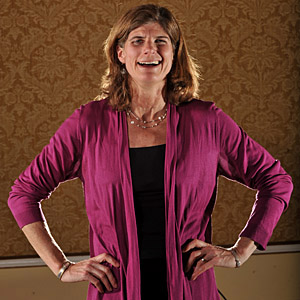
ST: Upon his retirement, Simon Lessing said triathlon at the highest levels is no longer as fun as it was back then. He said that in the beginning it was like a family.
KS: Those are the days I look back upon with the most fondness. There were a handful of pros and when we went to a race, we spent 4-5 days training, racing and doing everything together. The competition was almost an afterthought.
ST: Almost!
KS: Almost. But on race day you were very serious. You gave it your all. But the rest of the time it was really an experience. I mean I went to one race in Austria to see what the country was like. They’d take us on horse drawn carriage in the mountains to a little inn to have dinner. I’d travel with my husband Michael and we would definitely make everything into a fun trip.
Definitely we noticed post-Olympics it became much more serious, a lot less play, a lot more ‘We are here for a reason it is to get world ranking points.’ I found that approach would have worn on me. It was more of a business and you were in it for a very distinct reason – not for life experience
ST: Was that camaraderie, that fun-loving approach one of the reasons you have lasted so long in triathlon?
KS: I think it is a very hard lifestyle for people who are chasing the Olympic dream, to be honest. And it isn’t so much ‘I could live with this forever kind’ of deal. Sports have always been part of my everyday life. So that is why retirement isn’t a word I have really talked about. Because I didn't get in this sport to be making a living. It was a way to continue a lifestyle I love.
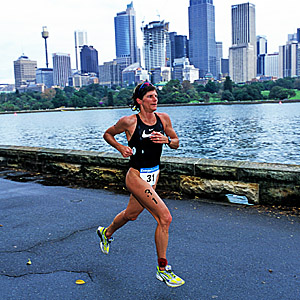
ST: Beyond the wins and losses, the money earned, medals won, what is has the sport come to mean for the everyday triathlete?
KS: It is a way of living your life, in a way. Taking care of yourself. Challenging yourself and being kind of goal-oriented. But it’s also wanting to experiences new places and new things. And doing it kind of intimately. When you are out there riding on the roads and biking up the mountains, then you are really getting to see a place rather than just driving through it. And you tend to meet a lot of fellow triathletes from other places and you immediately find you have a common bond.
ST: You shared with many other athletes the heartbreak of missing your shot at the Olympic team – even though you had been a dominating presence in your sport for many years. What do you think of these three Olympics?
KS: Well, they have been hugely exciting for the sport for sure. Getting on a new stage and exposing it to more people. You can’t help but feel sort of proud of your sport when it’s being showcased like that. It's just a wonderful opportunity for the people who got to go. And even I appreciate like crazy getting to try to make it, because it came at a time in my career when I really needed a goal like that. For me, I am extremely grateful for the excitement it adds to the sport,
ST: But what do you think of the collateral issues Olympic style racing has brought to the sport? In the beginning of the sport, the top performers consistently ruled the stage. With the transition to draft legal racing, that’s not so.
KS: I think there are some things I think may have changed the sport – not for the better in some ways. I think that some of the stars who’ve come out of it have been a little bit arbitrary who’s won. That’s made it not as fair, from my perspective. It’s a little more like rolling the dice.
ST; You are 47. Are you contemplating retirement?
KS: I’m probably going to fade away. The biggest problem is when you make the transition from pro to age group, you can’t really do it in a season. The amateurs won’t be too welcoming. I probably will have to take a sort of leave of absence when I get too embarrassed to race any more as a pro. Then I will have to figure something else out. But right now I’m taking it year by year. As long as I feel I am able to get into the prize money and compete against some of the people in the field.
ST: With your second place at Florida Ironman 70.3 in 2007, you’re still in it.
KS: Not always. I’ finding my bad races are a lot worse than they used to be. When I am not in shape I don't deserve to be there I have discovered. But hopefully those races are few and far between.
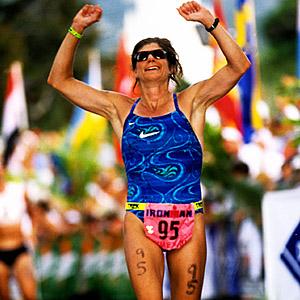
ST: What was your most exciting race?
KS: Any race I was in contention. But Orlando 1990, where I won my first world championship, was really exciting. I was in 4th place until Mile 4.
ST: Where you passed 1989 World Champion Erin Baker?
KS: Keep in mind I was fourth, which is where I finished the year before. My big goal was to be top three. It was really like the Olympics, I thought 4th was great, but I didn’t get anything more than what the 10th place guy received,. I wanted to make the podium and definitely top three was where it was at.
I was running in 4th and I was kind of bummed about it until around mile 4 and a half. Scott Molina was out on the course and he saw me running and I was sort of in a gloomy mood. And Orlando in the summer, at noon, on the golf course, was really hot and humid. Scott said ‘Karen, you gotta want it!’ And that sank in. ‘What am I complaining about?’ So it kinda gave a spark. Ahead, I could see second and third, Carol Montgomery and Joy Hanson and was I was trying to keep up with them as they passed Erin, so I kind also went by Erin without realizing it. Then the two of them were running together. With a half mile to go I pulled even. They didn’t know I was coming back. They'd already passed me and forgotten about me. And so I passed them on a little uphill with less than a mile to go. Clearly Carol was surprised. She turned to Joy and said ‘Karen’s back!’ I thought that was so funny. But I didn’t stop to laugh, I just took off so I really took them by surprise. After they passed Erin they had kind of looked at each other like: “OK. It’s you and me. When are we gonna sprint? Who’s doing what?” Then I just went Voom! and went by. And so then we ran into the castle in the Magic Kingdom at Disney World.
ST: Have you taken your kids there?
KS: A couple times.
ST: Ever tell them ‘This is the spot where I won the world title?’
KS: They are not interested!
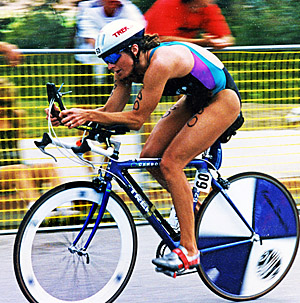
ST: You’ve won a lot of big ones. But tell about one of the big races that got away?
KS: The Manchester ITU World Championship in 1993 where I’m running with Michellie. I was feeling so good that I was convinced there was no way I was going to lose that race. We just ran side by side for a good three miles. I was thinking: ‘I have so much left. I can go so much harder.’ I caught up to her and I thought: ‘Oh yeah. I’m the faster runner today.’ Boy was I naïve! CHUCKLES That was fun, running side by side with her for a few miles.
When I could see the finish line, probably a quarter mile away, I started to go. I thought I was running fast, but it turns out she was just keeping up, keeping up. Then, with 100 meters to go, she went by really quick. Then I realized, ‘Oh, that's what a kick is!’ It was so devastating, and I was so surprised. I thought, ‘Could we go back and do that last three miles again? I could have run so much harder.’ What killed me is that I had so much left, but I just couldn’t sprint like that. I was running it over in my mind. “I coulda run 30 seconds a mile faster for three miles!’ I thought I was being real wily.
Q: Ever talk to Michellie about it.?
KS I am sure I talked to her a few times, joking that I’ll never get into a sprint with her again if I can help it. Certainly after that we did a race in Austria when I had maybe a 15-second lead on her. It was only a 5k and I knew of she got up to me it was all over. So I killed myself. I ran what felt like a full-on sprint for all 5k to keep it from coming down to a sprint at the end. So I learned my lesson. But I haven’t always been able to get away.
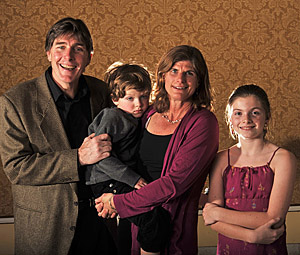
ST: Here’s what you said about Ironman in the early days of your career? “What was my attitude toward the Ironman at that time? I thought it was completely absurd. I thought it was an event for lunatics. It tested not your fitness and how fast you are, but how stupidly you could do this stupidness. How many dumb things could you put yourself through in a row?” Once did win Ironman Hawaii, did you stop to ask yourself ‘How did I become this Ironman champion?’
KS: CHUCKLES. Yes, quite a bit actually. Also, knowing my personality, I wondered how I had won the race that takes so much focus. Now I coach some people who are very hard workers and disciplined, like Dede Griesbauer for example. These people are so disciplined and so Type A compared to me – Dede will be the first to admit it — not missing a workout and doing everything possible –diet and strengthening, taking care of all the details. Whereas I sometimes look at myself and think ‘I am such a loser.’ I don’t take care of all these things. I know I have a little nick in my tire and I’ll still do the race without changing it. So how could I ever get to be a world champion? It is crazy! There must be some things in yourself that are the right tools. But boy! There are certainly a lot of other things that are strikes against me I think.
ST: Do you have a race now when thing aren't going so well but you are still really happy just because you are out there?
KS: There have been enough times where I haven’t been able to race because I’ve been hurt. Certainly the last couple of years, I’ve had more overuse injuries than I’ve ever had before. I think I’m just training the way I used to and now I realize I can’t quite maintain the intensity and the workload. So I definitely I appreciate just getting out there and not even caring necessarily where I am. Just being able to throw my hat in the ring. .
ST: After your accidents and injuries, have you overcome the fear of going out for a ride?
KS: I very definitely have had that for a while. There are certain roads and times of day now that I get really apprehensive about being there and I have changed some of my routes and the times I go out. So I certainly can't say it doesn’t affect me. Sometimes I hear a truck behind me and I think ‘Boy, my stomach is just churning. It‘s an inner response I can’t really control.”


